- Home
- Muriel Spark
The Girls of Slender Means Page 4
The Girls of Slender Means Read online
Page 4
I am sure you receive many admiring letters, and have hesitated to add yet another to your post-bag. But since my release from prison, where I have been for the past two years and four months, I have felt more . and more that I want you to know how much your novels meant to me during that time. I had few visitors. My allotted weekly hours of leisure were spent in the Library. It was unheated alas, but I did not notice the cold as I read on. Nothing I read gave me so much courage to face the future and to build a new future on my release as For Whom The Bell Tolls. The novel gave me back my faith in life.
I just want you to know this, and to say ‘Thank you’.
Yours sincerely
(Miss) J. Wright.
PS. This is not a begging letter. I assure you I would return any money that was sent to me.
If this succeeded in reaching him it might bring a hand-written reply. The . prison letter and the asylum letter were more liable to bring replies in the author’s own hand than any other type of letter, but one had to choose an author ‘with heart’, as Rudi said. Authors without heart seldom replied at all, and if they did it was a type-written letter. For a type-written letter signed by the author, Rudi paid two shillings if the autograph was scarce, but if the author’s signature was available everywhere, and the letter a mere formal acknowledgement, Rudi paid nothing. For a letter in the author’s own handwriting Rudi paid five shillings for the first page and a shilling thereafter. Jane’s ingenuity was therefore awakened to the feat of composing the sort of letters which would best move the recipient to reply in total holograph.
Rudi paid for the writing paper and the postage. He told her he only wanted the letters ‘for sentimental purpose of my collection’. She had seen his collection. But she assumed that he was collecting them with an eye to their increasing value year by year.
‘If I write myself it does not ring true; I do not get interesting replies. By the way, my English is not like the English of an English girl.’
She would have made her own collection if only she had not needed the ready money, and could afford to save up the letters for the future.
‘Never ask for money in your letters,’ Rudi had warned her. ‘Do not mention the subject of money. It makes criminal offence under false pretences.’ However, she had the brain-wave of adding her postscript, to make sure.
Jane had worried, at first, lest she should be found out and get into some sort of trouble. Rudi reassured her. ‘You say you only make a joke. It is not criminal. Who would check up on you, by the way? Do you think Bernard Shaw is going to write and make questions about you from the old aunt? Bernard Shaw is a Name.’
Bernard Shaw had in fact proved disappointing. He had sent a type-written postcard:
Thank you for your letter in praise of my writings. As you say they have consoled you in your misfortunes, I shall not attempt to gild the lily by my personal comments. As you say you desire no money I shall not press upon you my holograph signature which has some cash value. G.B.S.
The initials, too, had been typed.
Jane learned by experience. Her illegitimate-child letter brought a sympathetic reply from Daphne du Maurier, for which Rudi paid his price. With some authors a scholarly question about the underlying meaning worked best. One day, on a brain-wave, she wrote to Henry James at the Athenaeum Club.
‘That was foolish of you because James is dead, by the way,’ Rudi said.
‘Do you want a letter from an author called Nicholas Farringdon?’ she said.
‘No, I have known Nicholas Farringdon, he’s no good, he is not likely to be a Name ever. What has he written?’
‘A book called The Sabbath Notebooks.’
‘Is it religious?’
‘Well, he calls it political philosophy. It’s just a lot of notes and thoughts.’
‘It smells religious. He will finish up as a reactionary Catholic, to obey the Pope. Already I have predicted this before the war.’
‘He’s jolly good-looking.’
She hated Rudi. He was not at all attractive. She addressed and stamped her letter to Ernest Hemingway and ticked off his name on the list, writing the date beside it. The girls’ voices had disappeared from the wash-room. Anne’s wireless was singing:
There were angels dining at the Ritz
And a nightingale sang in Berkeley Square.
It was twenty minutes past six. There was time for one more letter before supper. Jane looked down the list.
Dear Mr Maugham,
I am addressing this letter to you at your club… .
Jane paused for thought. She ate a square of chocolate to keep her brain going till supper-time. The prison letter might not appeal to Maugham. Rudi had said he was cynical about human nature. On a brain-wave she recalled that he had been a doctor. It might be an idea to make up a sanatorium letter… . She had been ill for two years and four months with tuberculosis. After all, this disease was not attributable to human nature, there was nothing in it to be cynical about. She regretted having eaten the chocolate, and put the rest of the bar right at the back of a shelf in her cupboard where it was difficult to reach, as if hiding it from a child. The rightness of this action and the wrongness of her having eaten any at all were confirmed by Selina’s voice from Anne’s room. Anne had turned off the wireless and they had been talking. Selina would probably be stretched out on Anne’s bed in her languid manner. This became certain as Selina began to repeat, slowly and solemnly, the Two Sentences.
The Two Sentences were a simple morning and evening exercise prescribed by the Chief Instructress of the Poise Course which Selina had recently taken, by correspondence, in twelve lessons for five guineas. The Poise Course believed strongly in autosuggestion and had advised, for the maintenance of poise in the working woman, a repetition of the following two sentences twice a day:
Poise is perfect balance, an equanimity of body and mind, complete composure whatever the social scene. Elegant dress, immaculate grooming, and perfect deportment all contribute to the attainment of self-confidence.
Even Dorothy Markham stopped her chatter for a few seconds every morning at eight-thirty and evening at six-thirty, in respect for Selina’s Sentences. All the top floor was respectful. It had cost five guineas. The two floors below were indifferent. But the dormitories crept up on the landings to listen, they could hardly believe their ears, and saved up each word with savage joy to make their boy-friends in the Air Force laugh like a drain, which was how laughter was described in those circles. At the same time, the dormitory girls were envious of Selina, knowing in their hearts they would never quite be in the Selina class where looks were concerned.
The Sentences were finished by the time Jane had shoved her remaining piece of chocolate well out of sight and range. She returned to the letter. She had T.B. She gave a frail cough and looked round the room. It contained a wash-basin, a bed, a chest-of-drawers, a cupboard, a table and lamp, a wicker chair, a hard chair, a bookcase, a gas-fire and a meter-box with a slot to measure the gas, shilling by shilling. Jane felt she might easily be in a room in a sanatorium.
‘One last time,’ said Joanna’s voice from the floor below. She was now rehearsing Nancy Riddle, who was at this moment managing her standard English vowels very well.
‘And again,’ said Joanna. ‘We’ve just got time before supper. I’ll read the first stanza, then you follow on.’
At the top of the house the apples are laid in rows,
And the skylight lets the moonlight in, and those
Apples are deep-sea apples of green. There goes
A cloud on the moon in the autumn night.
4
It was July 1945, three weeks before the general election.
They are lying in rows there, under the gloomy beams;
On the sagging floor; they gather the silver streams
Out of the moon, those moonlit apples of dreams
And quiet is the steep stair under.
‘I wish she would stick to The Wreck of the Deutschland.
’
‘Do you? I rather like Moonlit Apples.’
We come now to Nicholas Farringdon in his thirty-third year. He was said to be an anarchist. No one at the May of Teck Club took this seriously as he looked quite normal; that is to say, he looked slightly dissipated, like the disappointing son of a good English family that he was. That each of his brothers — two accountants and one dentist — said of him from the time he left Cambridge in the mid 1930s, ‘Nicholas is a bit of a misfit, I’m afraid,’ would not have surprised anyone.
Jane Wright applied for information about him to Rudi Bittesch who had known Nicholas throughout the 1930s. ‘You don’t bother with him. He is a mess by the way,’ Rudi said. ‘I know him well, he is a good friend of mine.’ From Rudi she gathered that before the war he had been always undecided whether to live in England or France, and whether he preferred men or women, since he alternated between passionate intervals with both. Also, he could never make up his mind between suicide and an equally drastic course of action known as Father D’Arcy. Rudi explained that the latter was a Jesuit philosopher who had the monopoly for converting the English intellectuals. Nicholas was a pacifist up to the outbreak of war, Rudi said, then he joined the Army. Rudi said, ‘I have met him one day in Piccadilly wearing his uniform, and he said to me the war has brought him peace. Next thing he is psychoanalysed out of the Army, a wangle, and he is working for the Intelligence. The anarchists have given him up but he calls himself an anarchist, by the way.’
Far from putting Jane against Nicholas Farringdon, the scraps of his history that came to her by way of Rudi gave him an irresistible heroism in her mind, and, through her, in the eyes of the top-floor girls.
‘He must be a genius,’ said Nancy Riddle.
Nicholas had a habit of saying ‘When I’m famous … ‘when referring to the remote future, with the same cheerful irony that went into the preface of the bus conductor on the No. 73 route to his comments on the law of the land: ‘When I come to power …
Jane showed Rudi The Sabbath Notebooks, so entitled because Nicholas had used as an epigraph the text ‘The Sabbath was made for Man, not Man for the Sabbath’.
‘George must be out of his mind to publish this,’ Rudi said when he brought it back to Jane. They sat in the recreation room at the other end of which, cornerwise by the open French window, a girl was practising scales on the piano with as much style as she could decently apply to the scales. The music-box tinkle was far enough away, and sufficiently dispersed by the Sunday morning sounds from the terrace, not to intrude too strongly on Rudi’s voice, as he read out, in his foreign English, small passages from Nicholas’s book in order to prove something to Jane. He did this as a cloth merchant, perhaps wishing to persuade a customer to buy his best quality of goods, might first produce samples of inferior stuff, feel it, invite comment, shrug, and toss it away. Jane was convinced that Rudi was right in his judgement of what he was reading, but she was really more fascinated by what small glimpses of Nicholas Farringdon’s personality she got from Rudi’s passing remarks. Nicholas was the only presentable intellectual she had met.
‘It is. not bad, not good,’ said Rudi, putting his head this way, that way, as he said it. ‘It is mediocrity. I recall he composed this in 1938 when he had a freckled bed-mate of the female sex; she was an anarchist and pacifist. Listen, by the way …‘ He read out:
X is writing a history of anarchism. Anarchism properly has no history in the sense that X intends — i.e. in the sense of continuity and development. It is a spontaneous movement of people in particular times and circumstances. A history of anarchism would not be in the nature of political history, it would be analogous to a history of the heart-beat. One may make new discoveries about it, one may compare its reactions under varying conditions, but there is nothing new of itself.
Jane was thinking of the freckled girl-friend whom Nicholas had slept with at the time, and she almost fancied they had taken The Sabbath Notebooks to bed together. ‘What happened to his girl-friend?’ Jane said. ‘There is nothing wrong with this,’ Rudi said, referring to what he had just read, ‘but it is not so magnificent a great truth that he should like a great man place it on the page, by the way, in a paragraph alone. He makes pensées as he is too lazy to write the essay. Listen …‘
Jane said, ‘What happened to the girl?’
‘She went to prison for pacifism maybe, I don’t know. If I would be George I would not touch this book. Listen …’
Every communist has a fascist frown; every fascist has a communist smile.
‘Ha!‘ said Rudi.
‘I thought that was a very profound bit,’ Jane said, as it was the only bit she could remember.
‘That is why he writes it in, he counts that the bloody book has got to have a public, so he puts in some little bit of aphorism, very clever, that a girl like you likes to hear, by the way. It means nothing, this, where is the meaning?’ Most of Rudi’s last words were louder-sounding than he had intended, as the girl at the piano had paused for rest.
‘There’s no need to get excited,’ said Jane loudly.
The girl at the piano started a new set of rippling tinkles.
‘We move to the drawing-room,’ said Rudi.
‘No, everyone’s in the drawing-room this morning,’ Jane said. ‘There’s not a quiet corner in the drawing-room.’ She did not particularly want to display Rudi to the rest of the club.
Up and down the scales went the girl at the piano. From a window above, Joanna, fitting in an elocution lesson with Miss Harper, the cook, in the half-hour before the Sunday joint was ready to go in the oven, said, ‘Listen’:
Ah ! Sun-flower! weary of time,
Who countest the steps of the Sun;
Seeking after that sweet golden dime,
Where the traveller’s journey is done;
‘Now try it,’ said Joanna. ‘Very slowly on the third line. Think of a sweet golden clime as you say it.’
Ah ! Sun-flower! …
The dormitory girls who had spilled out of the drawing-room on to the terrace chattered. like a parliament of fowls. The little notes of the scales followed one another obediently. ‘Listen,’ said Rudi:
Everyone should be persuaded to remember how far, and with what a pathetic thump, the world has fallen from grace, that it needs must appoint politicians for its keepers, that its emotions, whether of consolation at breakfast-time or fear in the evening… .
Rudi said, ‘You notice his words, that he says the world has fallen from grace? This is the reason that he is no anarchist, by the way. They chuck him out when he talks like a son of the Pope. This man is a mess that he calls himself an anarchist; the anarchists do not make all that talk of original sin, so forth; they permit only anti-social tendencies, unethical conduct, so forth. Nick Farringdon is a diversionist, by the way.’
‘Do you call him Nick?’ Jane said.
‘Sometimes in the pubs, The Wheatsheaf and The Gargoyle, so on, he was Nick in those days. Except there was a barrow-boy called him Mr Farringdon. Nicholas said to him, “Look, I wasn’t christened Mister,” but was no good; the barrow-boy was his friend, by the way.’
‘Once more,’ said Joanna’s voice.
Ah.! Sun-flower! weary of time,
‘Listen,’ said Rudi:
Nevertheless, let our moment or opportunity be stated. We do not need a government. We do not need a House of Commons. Parliament should dissolve forever. We could manage very well in our movement towards a complete anarchist society, with our great but powerless institutions: we could manage with the monarchy as an example of the dignity inherent in the free giving and receiving of precedence and favour without power; the churches for the spiritual needs of the people; the House of Lords for purposes of debate and recommendation; and the universities for consultation. We do not need institutions with power. The practical affairs of society could be dealt with locally by the Town, Borough, and Village Councils. International affairs could be conducted by variable repr
esentatives in a non-professional capacity. We do not need professional politicians with an eye to power. The grocer, the doctor, the cook, should serve their country for a term as men serve on a jury. We can be ruled by the corporate will of men’s hearts alone. It is Power that is defunct, not as we are taught, the powerless institutions.
‘I ask you a question,’ Rudi said. ‘It is a simple question. He wants monarchy, he wants anarchism. What does he want? These two are enemies in all of history. Simple answer is, he is a mess.’
‘How old was the barrow-boy?’ Jane said.
‘And again,’ said Joanna’s voice from the upper window.
Dorothy Markham had joined the girls on the sunny terrace. She was telling a hunting story. ‘… the only one time I’ve been thrown, it shook me to the core. What a brute!’
‘Where did you land?’
‘Where do you think?’
The girl at the piano stopped and folded her scale-sheet with seemly concentration.
‘I go,’ said Rudi, looking at his watch. ‘I have an appointment to meet a contact for a drink.’ He rose and once more, before he handed over the book, flicked through the type-written pages. He said, sadly, ‘Nicholas is a friend of mine, but I regret to say he’s a non-contributive thinker, by the way. Come here, listen to this:’
There is a kind of truth in the popular idea of an anarchist as a wild man with a home-made bomb in his pocket. In modern times this bomb, fabricated in the back workshops of the imagination, can only take one effective form: Ridicule.
Jane said, “‘Only take” isn’t grammatical, it should be “take only”. I’ll have to change that, Rudi.’
*
So much for the portrait of the martyr as a young man as it was suggested to Jane on a Sunday morning between armistice and armistice, in the days of everyone’s poverty, in 1945. Jane, who lived to distort it in many elaborate forms, at the time merely felt she was in touch with something reckless, intellectual, and Bohemian by being in touch with Nicholas. Rudi’s contemptuous attitude bounded back upon himself in her estimation. She felt she knew too much about Rudi to respect him; and was presently astonished to find that there was indeed a sort of friendship between himself and Nicholas, lingering on from the past.

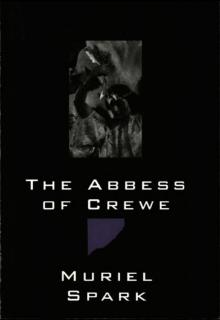 The Abbess of Crewe: A Modern Morality Tale
The Abbess of Crewe: A Modern Morality Tale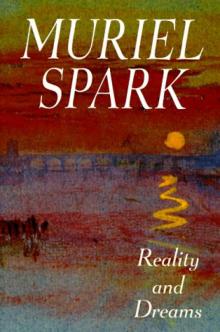 Reality and Dreams
Reality and Dreams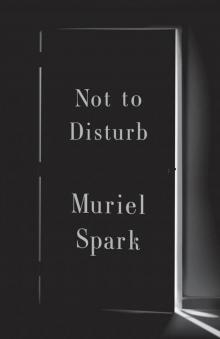 Not to Disturb
Not to Disturb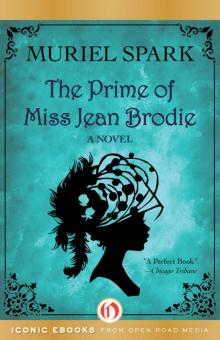 The Prime of Miss Jean Brodie
The Prime of Miss Jean Brodie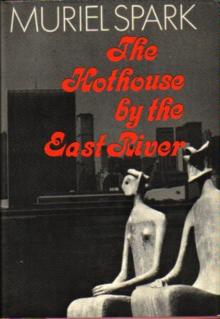 The Hothouse by the East River
The Hothouse by the East River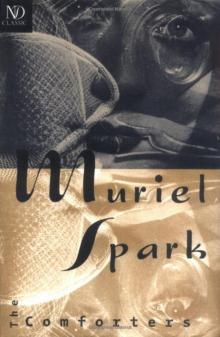 The Comforters
The Comforters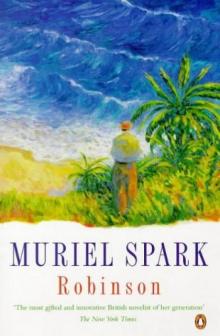 (1958) Robinson
(1958) Robinson Unknown
Unknown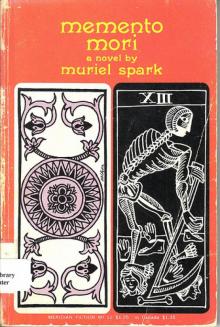 Memento Mori
Memento Mori The Finishing School
The Finishing School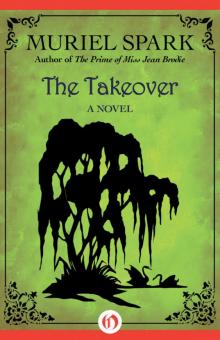 The Takeover
The Takeover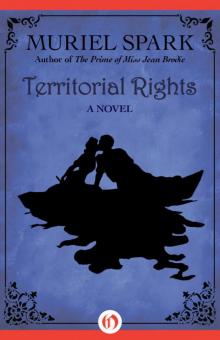 Territorial Rights
Territorial Rights The Complete Short Stories
The Complete Short Stories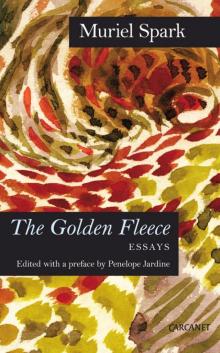 The Golden Fleece: Essays
The Golden Fleece: Essays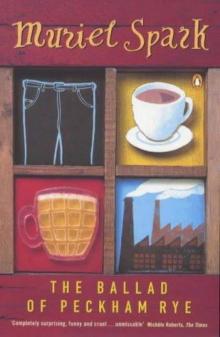 The Ballad of Peckham Rye
The Ballad of Peckham Rye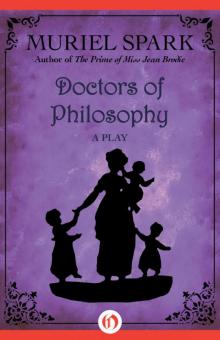 Doctors of Philosophy: A Play
Doctors of Philosophy: A Play The Mandelbaum Gate
The Mandelbaum Gate Loitering With Intent
Loitering With Intent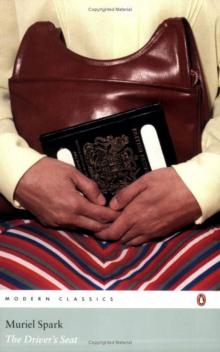 The Driver's Seat
The Driver's Seat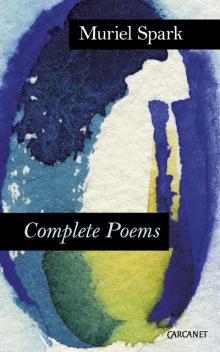 Complete Poems: Muriel Spark
Complete Poems: Muriel Spark Symposium
Symposium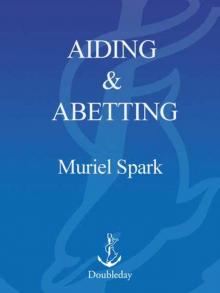 Aiding and Abetting
Aiding and Abetting The Golden Fleece
The Golden Fleece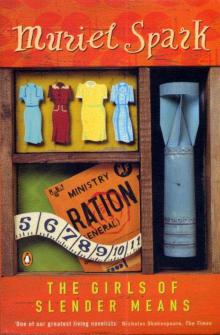 The Girls of Slender Means
The Girls of Slender Means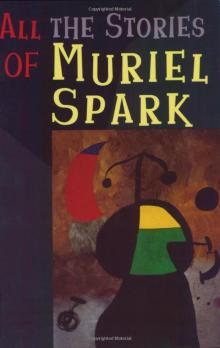 Alice Long’s Dachshunds
Alice Long’s Dachshunds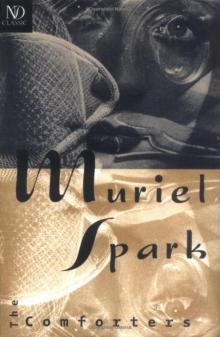 (1954) The Comforters
(1954) The Comforters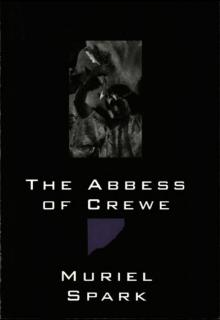 The Abbess of Crewe
The Abbess of Crewe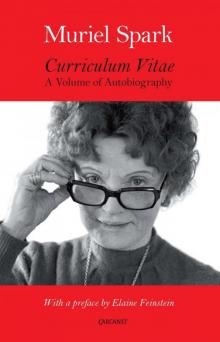 Curriculum Vitae
Curriculum Vitae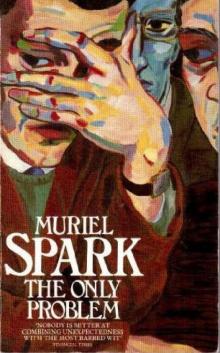 The Only Problem
The Only Problem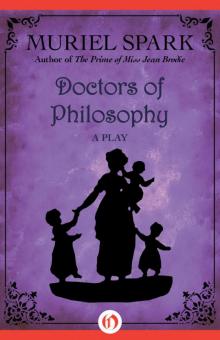 Doctors of Philosophy
Doctors of Philosophy